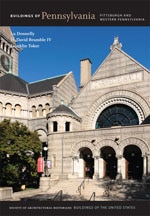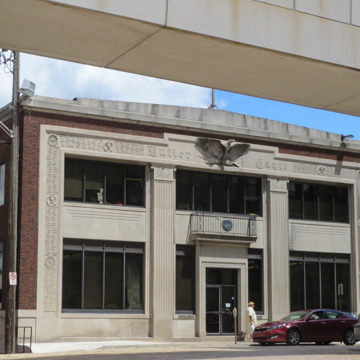This handsome limestone, ornamented Art Deco building opposite the courthouse provides space for the newspaper's newsroom and business offices. Architect Edward B. Lee (1876–1956) trained at Harvard and at the Ecole des Beaux-Arts in Paris, and worked in the architectural firms of McKim, Mead and White; Cram, Wentworth and Goodhue; and Alden and Harlow in Pittsburgh. From 1910, Lee was the resident architect in charge of the Pittsburgh projects of Palmer, Hornbostel and Jones. This commission, though, is credited to Lee alone. The dark brick, two-story building's three-bay facade is outlined with a limestone decorative frieze in a Greek key motif punctuated by rosettes and plaques, and crowned by a spread-winged eagle with the paper's name flanking it. The effect is a blend of stylized classical elements stripped to their essential components.
You are here
Butler Eagle Building
If SAH Archipedia has been useful to you, please consider supporting it.
SAH Archipedia tells the story of the United States through its buildings, landscapes, and cities. This freely available resource empowers the public with authoritative knowledge that deepens their understanding and appreciation of the built environment. But the Society of Architectural Historians, which created SAH Archipedia with University of Virginia Press, needs your support to maintain the high-caliber research, writing, photography, cartography, editing, design, and programming that make SAH Archipedia a trusted online resource available to all who value the history of place, heritage tourism, and learning.






